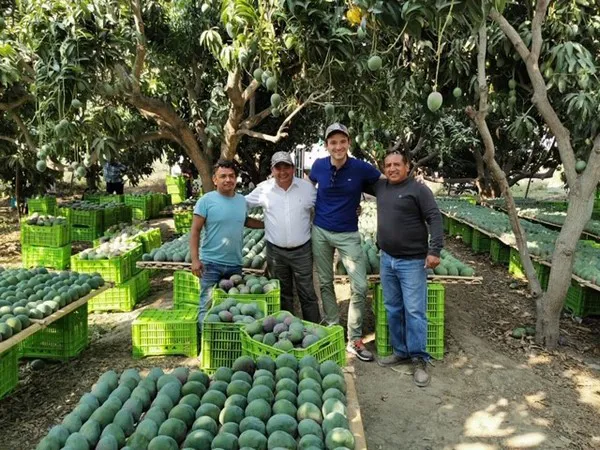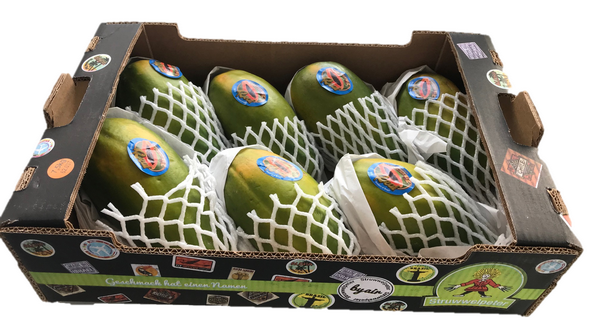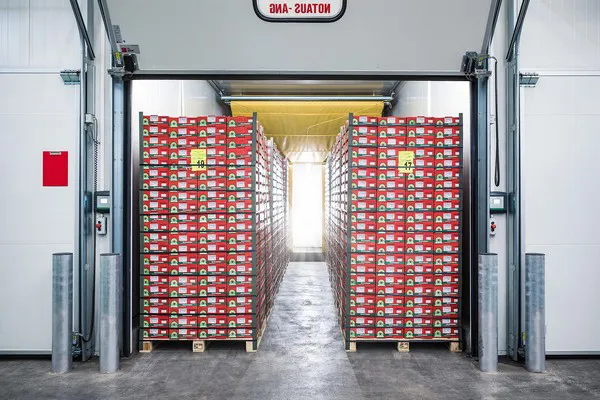With the end of autumn and colder temperatures approaching, these days more and more exotic fruits are ending up in the shopping carts of consumers, who in the summer months have access to the abundant seasonal and regional fruit selections. Probably the most popular of the exotic fruits is the avocado, which continues to be doing great and is still selling well in summer. But fruits such as mangos and papayas are also enjoying growing popularity in the German trade. We spoke about the current season to Santiago Contreras from the import department of Hausladen Fruchthandelsgesellschaft.
Sales of air freighted mangoes affected by lockdown
"Currently, we are at the peak of the Brazilian Kent mango season. The quality and taste of the product is very good and the supply is sufficient. We will still be receiving goods from Brazil until the end of December." At the same time, the first Kent mangos from Peru will be loaded at the end of November, these should arrive in Europe in week 51.
Peru is a problem child this season, according to Contreras: "The situation in Peru is tense, because it hasn't rained sufficiently for months. This is exacerbated by the La Niña phenomenon and the correspondingly lower temperatures." La Niña is a climate phenomenon that is part of a natural-global climate cycle. It has two extremes: a warm phase, known as El Niño, and a cold phase, known as La Niña. This cold phase occurs when strong trade winds from the west cause sea temperatures to drop.
"In Peru, this affects the coastal zone in the north, where Peruvian agriculture is concentrated, and in particular the regions of Piura, Lambayeque and La Libertad, where the water reservoirs are almost empty. The hydric stress for the plants could be dramatic if it does not rain in the next two weeks". In this case, fruits of the 9/10/12 sizes can be expected almost exclusively. "In addition to the shortage of large varieties, the fruit would also ripen earlier. Producers would then be forced to harvest and export earlier."

Christoph Buchner last year, during a visit to the mango plantations in Peru (FreshPlaza report).
The market for mangos is relatively stable: "This is mainly due to the fact that the bulk of the shipped goods is marketed via the food retail trade, which has had stable sales in this product group until now, and during the first lockdown as well. In the case of air-shipped mangos, sales and the market are affected, but the volumes from the source are not too large to be strongly affected by the restricted market." There are Kent mangos from Brazil on the German market, as well as the first air-freighted mangos from Peru.
Stable papaya market
"The market for papayas is also stable at present, with sufficient volumes coming in from Brazil. Quality and taste are good. Demand is lower between May and October, but increases significantly during the cool months and reaches its seasonal peak in winter."

Formosa papayas from the Struwwelpeter brand
Chile dominates avocado sales
The avocado market is currently dominated by Chilean deliveries, followed by Mexico and Colombia and to a lesser extent Israel, Spain and Morocco. After a very difficult transition from Peru to Chile, the market is now well supplied. Since Mexico exports larger quantities to Europe than usual, there is pressure on small calibers. This should subside as soon as demand from the USA increases again in mid-December.
Andreas Buchner during a FreshPlaza visit to the Munich site in summer 2019.
Due to the limited air freight capacities, production has been self-regulating so far: "Logistics continues to suffer from fluctuations and remains uncertain. Some airlines have taken their daily connections out of service. Some routes are flown three times a week, others not at all. This makes for volatile prices and these are rising even more due to the upcoming pre-Christmas period." Passenger flights from South America to Europe have dropped by 73% compared to 2019. This decline in cargo area is creating fierce competition on existing flights and driving up prices, he explains.
Exotics in the summer months
Avocados are among the few exotic products that can stand up to the "summer fruits" in summer and are able to keep their volume stable: "The avocado has managed to become a year-round perennial. The mango market, on the other hand, traditionally drops after Easter. This year, demand remained very high until the summer vacations (July) and is now rising again."
Exotics from the EU?
The cultivation of exotics in Spain is becoming increasingly important - will this become a problem for overseas goods in the future? Contreras does not believe so: "Spanish avocados or mangos are only available in a rather short time frame. The Spanish fruits can compete with those from other Mediterranean countries and complement each other, but it is not advisable to focus on just one origin." Diverse influences like on- and off-seasons, storms, environmental disasters and the growing market also in countries like China, require to import various origins permanently to be flexible and reliable.
Interest in exclusive mangos and tropical avocados is growing
"Kent, Keitt and Palmer continue to be the most prominent mango varieties in Europe, but less well known Israeli varieties such as Omer, Noa and Shelli are also being marketed more and more. Nam Dok Mai and Ataulfo are delivered exclusively by air and are also very attractive," Contreras confirms. "Consumers are increasingly better informed about their food, which is why these varieties continue to gain in importance."
There is also a lot going on with avocados: "Thanks to their size, tropical avocados like Carla from the Dominican Republic and Brazilian varieties like Margarida, Breda, Geada, Fortuna (and others) are arousing consumer interest." Some of these exotic varieties already dominate their home market and are now slowly finding their way to Europe. Nevertheless, the Hass-Avocado remains the most imported variety.

Christmas time
It is difficult to predict how the year will end: "With the lockdowns and restrictions everywhere in the EU, it is almost impossible to make any forecasts. Traditionally, there is a slight decline in food retail sales between Christmas and New Year. This year we expect a normal Christmas and an increase in demand between the years as fewer people can go on vacation."
For more information:
Santiago Contreras 
Hausladen Fruchthandelsgesellschaft mbH
Tel: 089 72014 0
[email protected]
www.hausladen-frucht.de
